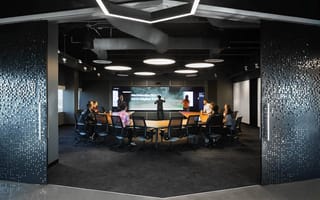Young tech companies in Los Angeles hail from a host of verticals, with some innovating in industries still stuck in the age of pen and paper. But as entrepreneurial hopefuls toil away in garages and coffee shops on their shots at glory, one multinational foundry is using its prestigious name and palatial office to build up cutting-edge startups of its own.
With 20 venture rooms designed to serve as offices for startups during innovation, incubation and commercialization, BCG Digital Ventures blends the corporate resources of some of the most influential businesses in the world with the spirit of a tech startup, helping create innovative new ventures for established companies of all stripes.
Recently, Built In LA spoke with Senior Engineer and Venture CTO Jay Van der Lyn and Lead Data Scientist Dr. Farshad Kheiri about their roles in launching and scaling new ventures, the technologies they're working on, and what they enjoy most about the work.

What responsibilities do Venture CTOs hold at BCG Digital Ventures?
As a venture CTO (V-CTO), my job is to assist the development of ventures by helping them navigate the technological landscape. By analyzing technology solutions, tools, frameworks and opportunities, V-CTOs compose development strategies that increase the velocity of venture maturity. We facilitate processes, best practices, modernization and agility in software engineering teams.
Beyond just engineering, it’s important to act as a liaison between product owners, stakeholders, clients and development teams so that venture production can be streamlined without sacrificing quality and assurance. Ultimately, we help enable the amplification of the venture into commercialization.
In addition, V-CTOs work together to help maintain a modern toolbox for ventures to have at their disposal. In the spirit of amplification venture delivery, having the right tool for the right job readily available is a must.
This balance of having a startup environment with the security of a corporation is very attractive as a family-focused software engineer.”
What attracted you to BCGDV?
Working at a startup is always attractive because you get the opportunity to learn the most cutting-edge technologies. Startups also allow you to redefine your limits and push yourself into the unknown. However, they also come with some personal risk because of their potential for instability and lack of career assurance.
Each time I embark on a venture, it's like joining a new startup with great potential. Beyond just the potential of the new venture to launch and scale, there’s always the opportunity to learn new technologies and work with people who are passionate about what they do. Personally, this balance of having a startup environment with the security of a corporation is very attractive as a family-focused software engineer.
On your current venture, what is the tech stack your team is working with?
Currently, my venture is utilizing full stack JavaScript. We are incorporating React and Redux over a Restful API using the Restify framework and store data in encrypted mongoDB clusters and 100 percent containerized docker environments. Our infrastructure is completely automated and highly available. We make use of Git Lab’s CI/CD pipelines, Mocha Chai testing frameworks, and orchestrate via Rancher Container Management. This allows our infrastructure to not only be HA, but cloud agnostic (with the preference of AWS at this time). Also, we have begun experimenting with JS-based data science tools, as well as GridDBs to provide recommendations and learning.
What technical skills make someone a right fit for BCGDV’s engineering team?
I like to look at engineers from a few angles:
- Full Stack: Full stack is broad, but as a general rule, we like our engineers to be capable enough to develop and deploy their solutions from start to finish.
- Agile: Our ventures are very agile and pivot often. Engineers with experience working in Agile environments tend to pick up our processes more quickly. We also adopt the Scrum methodology and framework, so experience delivering in iterations and weighing quality and risk is required.
- Agile Spike: This describes an engineer who demonstrates high competency in one or more specialties. Whether its full stack JavaScript, DevOps, data science or data engineering, it’s important to be great at what you do.
- Technical Breadth: Ventures are startups; we tend to explore and contribute to new technologies. Identifying and following trends and the technical landscape allows teams to stay ahead of industry norms. Having broad technical knowledge and a “bigger picture” attitude will always help.

What was it that attracted you to BCGDV?
Once I started learning more about the type of work BCGDV does, the culture and the opportunity to meet people from different sectors was really compelling. DV has been one of the best companies I have ever worked for because the types of projects and people keep me learning about cutting-edge technology. Working at DV continues to be a great learning experience for me.
BCGDV has been one of the best companies I have ever worked for because the types of projects and people keep me learning about cutting-edge technology.”
On the technical side, what are some of the tools the data science team works with? What types of insight do they provide?
There are many different mathematical software based on types of programming or special kinds of hardware that can be used. Some of the most popular software we use includes R, Python, Matlab, SAS and SPSS.
However, let’s not forget that these are just tools and are not necessary to become a data scientist. I think the most important part of being a data scientist is knowing the algorithms and being able to build algorithms to solve new problems. In most cases, because of the availability of the sheer volume of data, we need cloud servers with high RAM, and several GPUs and CPUs for our analysis.
What are some of the technical skills someone needs to possess to be a data scientist at BCGDV?
We are working with a broad scope of problems and this requires our data scientists to be knowledgeable about most machine learning techniques, recommendation engines, deep learning and natural language processing. All of our engineers need to be able to explain complex techniques in a way that non-experts understand.





